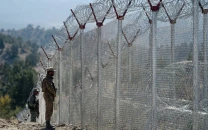British intelligence 'could have identified 7/7 ringleader'
Officer says MI5 had received intelligence about extremist called "Saddique" in March 2005.

British intelligence 'could have identified 7/7 ringleader'
The officer, known as Witness G, told the inquest into the attacks that MI5 had received intelligence about an extremist called "Saddique", from Batley in West Yorkshire, in March 2005.
"Saddique", reported to be in his 30s, was said to have attended a mujahideen training camp in Pakistan for two months in 2001.
MI5 and West Yorkshire Police, who received the initial intelligence, failed to identify the man, but it emerged after the bombings that he was Khan, even though agents had previously believed he had a different surname.
Khan and three other suicide bombers went on to detonate devices on three Tube trains and a London bus on July 7, 2005, killing 52 people.
Witness G said he could not reveal why the agency did not pursue "Saddique" but said there were good operational reasons for not doing so.
Hugo Keith QC, counsel to the inquest, asked him: "You could have found out who Saddique, surname not Khan, was, but for good reason no steps were taken in that direction."
Witness G replied: "I have a high degree of confidence that we could have done."
He accepted that this would have given agents a "greater chance" of uncovering the plot, but only if MI5 had used a "high degree of intrusive investigative measures", the inquest heard.
"If this person had been identified as Mohammed Sidique Khan and he had come under intensive investigation, therefore, I accept, a big if, then there would have been a greater chance that whatever he was plotting then, and we know he had started plotting by February or March 2005, might have come to light," Keith said.
Witness G answered: "Yes, a greater chance. I would say a high degree of intrusive investigative measures would have been required to uncover the plot from what we know of it now."
The inquests have already heard that Khan appeared on the periphery of another investigation, codenamed "Crevice", in 2004; but MI5 concluded at the time that he did not pose a threat to British citizens.
Witness G, who is being questioned by counsel for the families of the 52 victims, on Monday told the inquest that MI5 could not be held responsible for the attacks.



















COMMENTS
Comments are moderated and generally will be posted if they are on-topic and not abusive.
For more information, please see our Comments FAQ